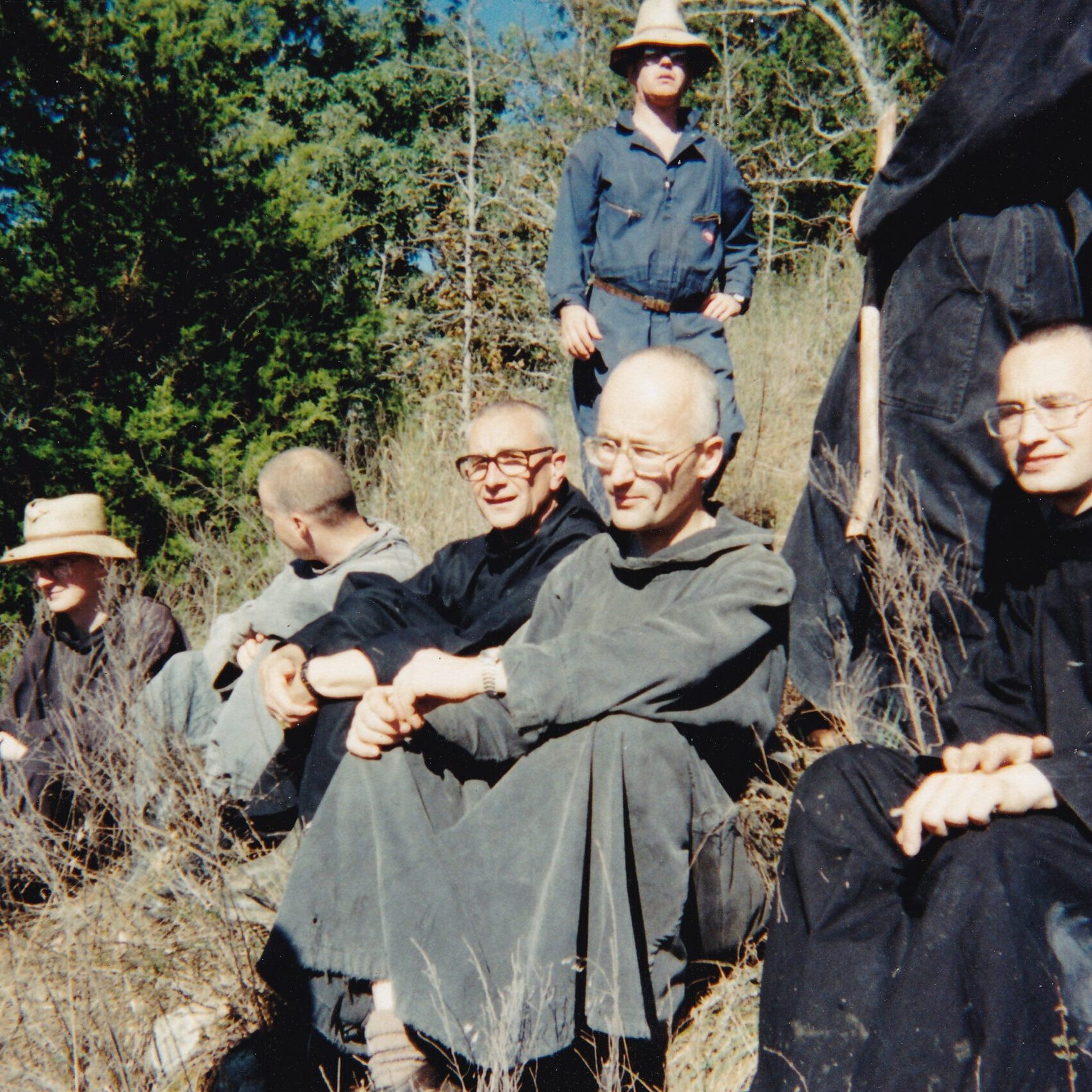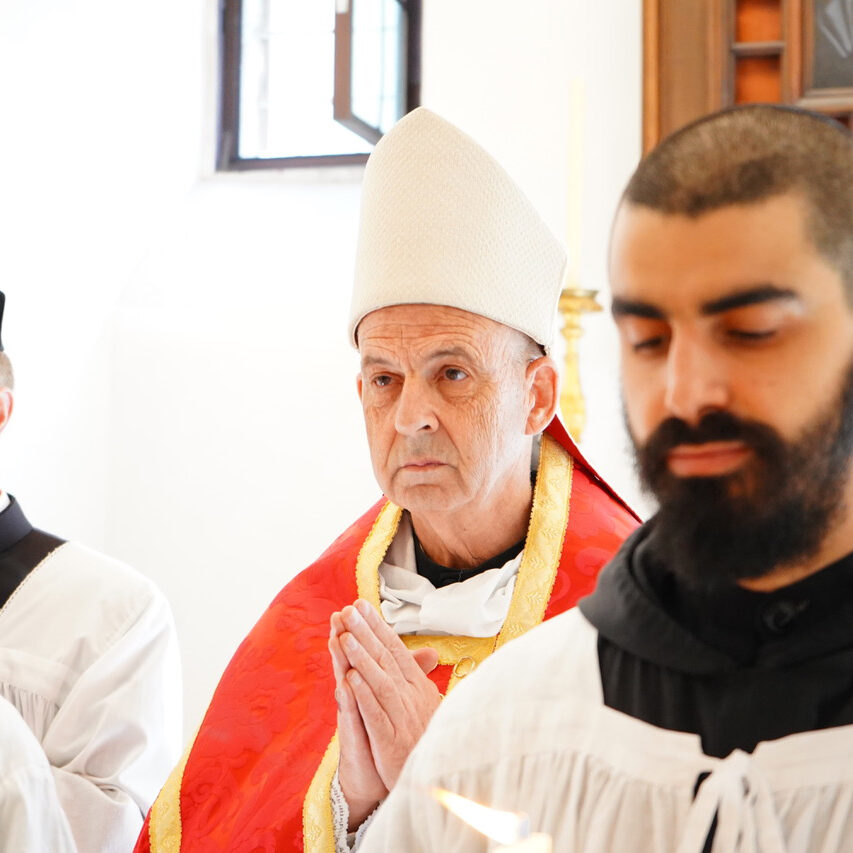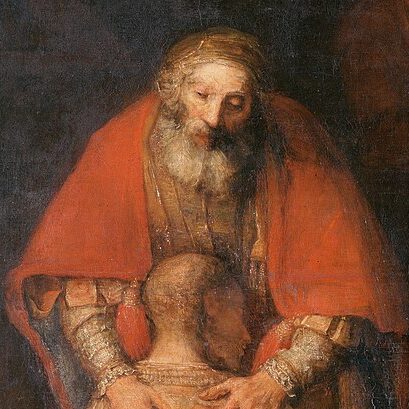Dear Friends of Our Lady of the Annunciation,
Although it seems like yesterday that we were mailing you our booklet on the Inauguration ceremonies of last February, I thought it important to write to you on behalf of Father Abbot at this time, in order, both to fill you in on more recent events in the life of the community, and to send along the images of our building project you will find enclosed.
“And every one who has left house, or brothers, or sisters, or father, or mother, of wife, or children, or land for the sake of my name, shall receive a hundred fold …” (Mt. 19, 29). Thanks to Almighty God and to your generosity this page of the Gospel has already become a reality during the first few months of our existence here at Clear Creek. So many people have brought us so many gifts and services! Little by little we have been able to adapt the existing buildings to our needs and to acquire the farm implements and tools which are indispensable for the upkeep of our vegetable garden, our orchard and our ranch. A well equipped wood-shop is being set up where we hope to begin making furniture for our own needs and in order to gain our livelihood in some measure.
In addition to the handsome herd of range cattle which arrived here last winter soon after the precious dairy cows, we have since been able to populate the chicken coop with a good number of not particularly handsome hens (they seem to keep losing feathers no matter what we try…), but which provide the kitchen with wonderful country eggs. The most recent addition to this monastic menagerie are our hair-sheep, who, along with their Pyrenees watch dogs, occupy the pasture lying between the monastery and the guest-house.
Even more impressive, however, than the amazing progress of these material things for which we are so grateful, is the arrival of numerous candidates for the monastic life. All our material activities are accomplished in view of constructing the spiritual edifice formed of monastic souls. Also, their ultimate purpose can be nothing but this: to provide a proper setting for pursuit of the Kingdom of Heaven. Such is the meaning of last part of the quotation from the Gospel of Saint Matthew given above : “…and also inherit eternal life.” But this takes a little explaining.
As a well known French Dominican Friar, the Reverend Father Dehau pointed out, in his book entitled L’Apostolat de Jesus, there are two rather distinct ways of living religious poverty. The Franciscan way is one which “liberates from earthly realities” by making them the object of a total renunciation, whereas the Benedictine form of holy poverty is one that, on the contrary “takes hold of earthly things” in order to give them a consecration, that is to consecrate them to the service of God. The individual Benedictine monk is totally poor, having nothing at all he can call his own, not even the habit he wears, but the monastery where he lives must be fairly well equipped, as Saint Benedict himself points out in his Rule (Chapter 66) :
“The monastery, if it be possible, ought to be so constructed that all things necessary, such as water, a mill, a garden, a bakery, and the various crafts may be contained within it; so that there may be no need for the monks to go abroad, for this is altogether inexpedient for their souls.”
One material reality of exceptional importance is the monastic church, place of the celebration of the Divine Mysteries and of all of what Saint Benedict refers to as the Opus Dei, the “Work of God”, to which his sons are instructed to prefer nothing : “Ergo nihil operi Dei praeponatur”, “Therefore, let nothing be preferred to the Work of God” (Chap. 43). This more solemn celebration of the Holy Liturgy requires a certain grandeur as befits the Divine majesty. “How awe-inspiring this place is!” exclaimed Jacob as he woke from the prophetic dream he had had in the wilderness near mount Bethel, “This is nothing less than the house of God; this is the gate of Heaven.” (Gen. 28, 17)
As many of you already know, we have been in contact with an Architect, Mr. Thomas Gordon Smith, wlio held the Chair of the School of Architecture at the University of Notre Dame for many years, before stepping down from that chairmanship in order to devote more time to practice. One of his current works is the Seminary of Our Lady of Guadalupe being constructed in Denton, Nebraska for the Priestly Fraternity of St. Peter.
Although as yet our own collaboration with Mr. Smith has been on a limited basis only–he realized the conceptual designs which accompany this letter–we believe that he and his team of Architects would be capable of planning and bringing to maturity our construction project (Phase I would include the church plus one big building to house the monks and some guests). Father Abbot Forgeot was quite satisfied with his exchanges with Professor Smith, both here and in France, and remains serene about the future: “Si Dieu le veut cela se réalisera .. If God wants this it will happen.”
Thanks greatly to your generous help, our daily bread has never been lacking and we know we can always count on your help. We fully realize that if this construction project is far beyond our present financial means, it is equally beyond yours … But we know as well that you want to be a part of this rather audacious enterprise of building a new monastery in the heart of the Oklahoma hills, something to last, perhaps, to the end of time, “something beautiful for God”.
So here is what we are asking : your prayers (those of little children are particularly effective, as well as those who suffer in some particular way), your suggestions, your competence, your help of every kind. We do not know yet when construction could begin, so we will have to continue building temporary structures in order to be able to accept all the candidates who are demanding to enter.
There is an expression which Our Blessed Father Saint Benedict employs in the Rule (Chap. 57) and which sums up perfectly the spirit in which we must all approach the formidable undertaking which lies ahead of us : “Ut in omnibus glorificetur Deus.” “That in all things God may be glorified.”
May Our Lady, who, at the moment of the Annunciation, became herself the perfect and Immaculate temple of the Word made flesh, smile down upon our modest efforts and bless each one of you and all your families.
br. Philip Anderson, Prior
Dear Friends of Our Lady of the Annunciation,
Although it seems like yesterday that we were mailing you our booklet on the Inauguration ceremonies of last February, I thought it important to write to you on behalf of Father Abbot at this time, in order, both to fill you in on more recent events in the life of the community, and to send along the images of our building project you will find enclosed.
“And every one who has left house, or brothers, or sisters, or father, or mother, of wife, or children, or land for the sake of my name, shall receive a hundred fold …” (Mt. 19, 29). Thanks to Almighty God and to your generosity this page of the Gospel has already become a reality during the first few months of our existence here at Clear Creek. So many people have brought us so many gifts and services! Little by little we have been able to adapt the existing buildings to our needs and to acquire the farm implements and tools which are indispensable for the upkeep of our vegetable garden, our orchard and our ranch. A well equipped wood-shop is being set up where we hope to begin making furniture for our own needs and in order to gain our livelihood in some measure.
In addition to the handsome herd of range cattle which arrived here last winter soon after the precious dairy cows, we have since been able to populate the chicken coop with a good number of not particularly handsome hens (they seem to keep losing feathers no matter what we try…), but which provide the kitchen with wonderful country eggs. The most recent addition to this monastic menagerie are our hair-sheep, who, along with their Pyrenees watch dogs, occupy the pasture lying between the monastery and the guest-house.
Even more impressive, however, than the amazing progress of these material things for which we are so grateful, is the arrival of numerous candidates for the monastic life. All our material activities are accomplished in view of constructing the spiritual edifice formed of monastic souls. Also, their ultimate purpose can be nothing but this: to provide a proper setting for pursuit of the Kingdom of Heaven. Such is the meaning of last part of the quotation from the Gospel of Saint Matthew given above : “…and also inherit eternal life.” But this takes a little explaining.
As a well known French Dominican Friar, the Reverend Father Dehau pointed out, in his book entitled L’Apostolat de Jesus, there are two rather distinct ways of living religious poverty. The Franciscan way is one which “liberates from earthly realities” by making them the object of a total renunciation, whereas the Benedictine form of holy poverty is one that, on the contrary “takes hold of earthly things” in order to give them a consecration, that is to consecrate them to the service of God. The individual Benedictine monk is totally poor, having nothing at all he can call his own, not even the habit he wears, but the monastery where he lives must be fairly well equipped, as Saint Benedict himself points out in his Rule (Chapter 66) :
“The monastery, if it be possible, ought to be so constructed that all things necessary, such as water, a mill, a garden, a bakery, and the various crafts may be contained within it; so that there may be no need for the monks to go abroad, for this is altogether inexpedient for their souls.”
One material reality of exceptional importance is the monastic church, place of the celebration of the Divine Mysteries and of all of what Saint Benedict refers to as the Opus Dei, the “Work of God”, to which his sons are instructed to prefer nothing : “Ergo nihil operi Dei praeponatur”, “Therefore, let nothing be preferred to the Work of God” (Chap. 43). This more solemn celebration of the Holy Liturgy requires a certain grandeur as befits the Divine majesty. “How awe-inspiring this place is!” exclaimed Jacob as he woke from the prophetic dream he had had in the wilderness near mount Bethel, “This is nothing less than the house of God; this is the gate of Heaven.” (Gen. 28, 17)
As many of you already know, we have been in contact with an Architect, Mr. Thomas Gordon Smith, wlio held the Chair of the School of Architecture at the University of Notre Dame for many years, before stepping down from that chairmanship in order to devote more time to practice. One of his current works is the Seminary of Our Lady of Guadalupe being constructed in Denton, Nebraska for the Priestly Fraternity of St. Peter.
Although as yet our own collaboration with Mr. Smith has been on a limited basis only–he realized the conceptual designs which accompany this letter–we believe that he and his team of Architects would be capable of planning and bringing to maturity our construction project (Phase I would include the church plus one big building to house the monks and some guests). Father Abbot Forgeot was quite satisfied with his exchanges with Professor Smith, both here and in France, and remains serene about the future: “Si Dieu le veut cela se réalisera .. If God wants this it will happen.”
Thanks greatly to your generous help, our daily bread has never been lacking and we know we can always count on your help. We fully realize that if this construction project is far beyond our present financial means, it is equally beyond yours … But we know as well that you want to be a part of this rather audacious enterprise of building a new monastery in the heart of the Oklahoma hills, something to last, perhaps, to the end of time, “something beautiful for God”.
So here is what we are asking : your prayers (those of little children are particularly effective, as well as those who suffer in some particular way), your suggestions, your competence, your help of every kind. We do not know yet when construction could begin, so we will have to continue building temporary structures in order to be able to accept all the candidates who are demanding to enter.
There is an expression which Our Blessed Father Saint Benedict employs in the Rule (Chap. 57) and which sums up perfectly the spirit in which we must all approach the formidable undertaking which lies ahead of us : “Ut in omnibus glorificetur Deus.” “That in all things God may be glorified.”
May Our Lady, who, at the moment of the Annunciation, became herself the perfect and Immaculate temple of the Word made flesh, smile down upon our modest efforts and bless each one of you and all your families.
br. Philip Anderson, Prior






